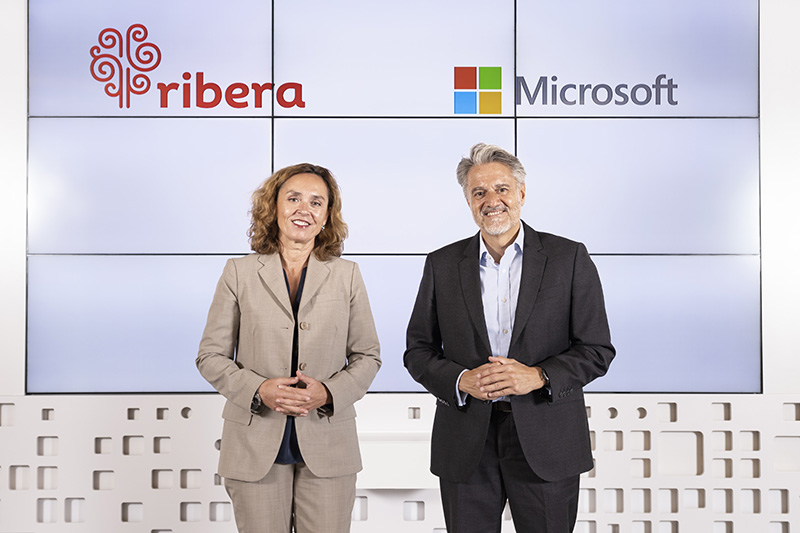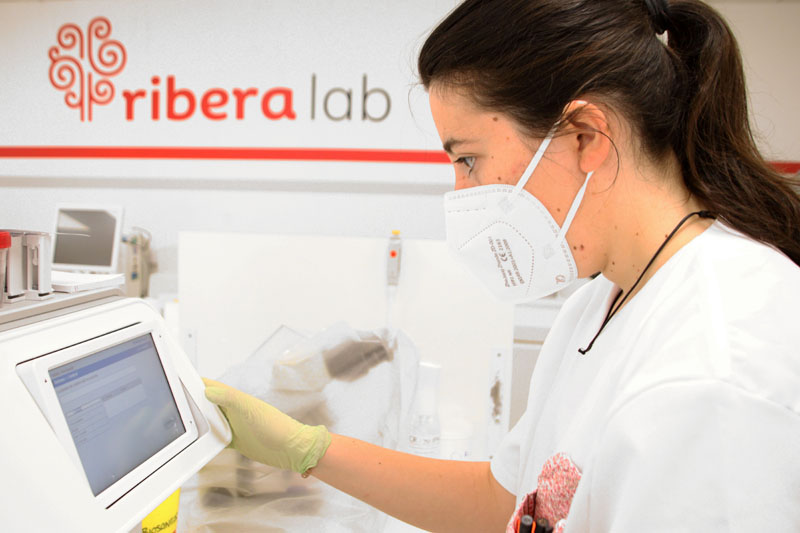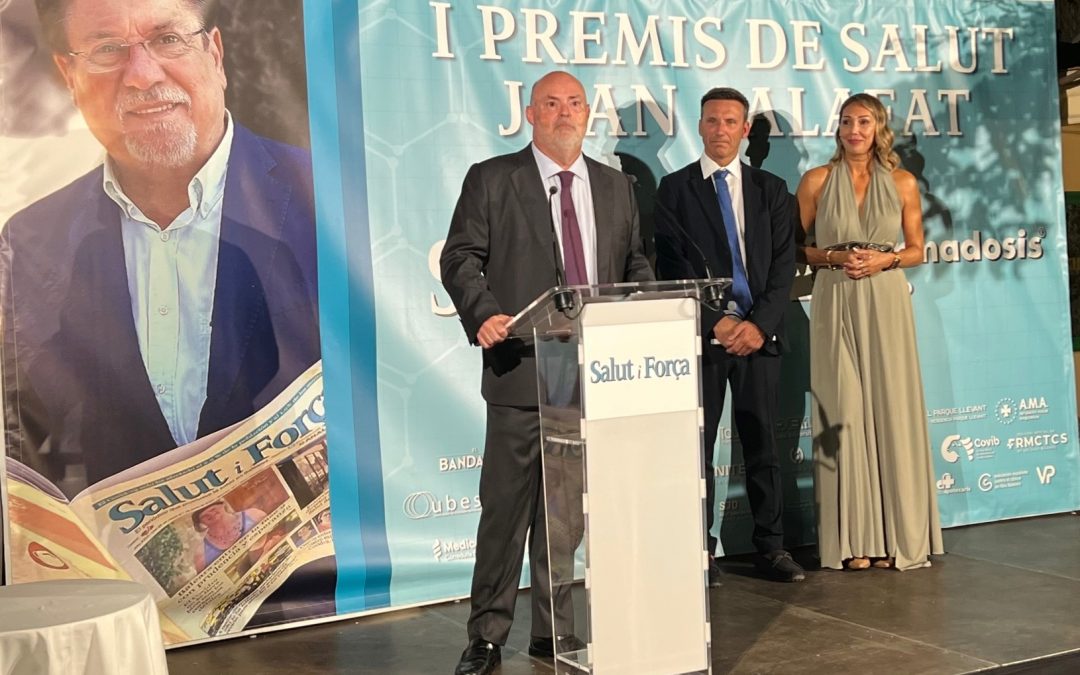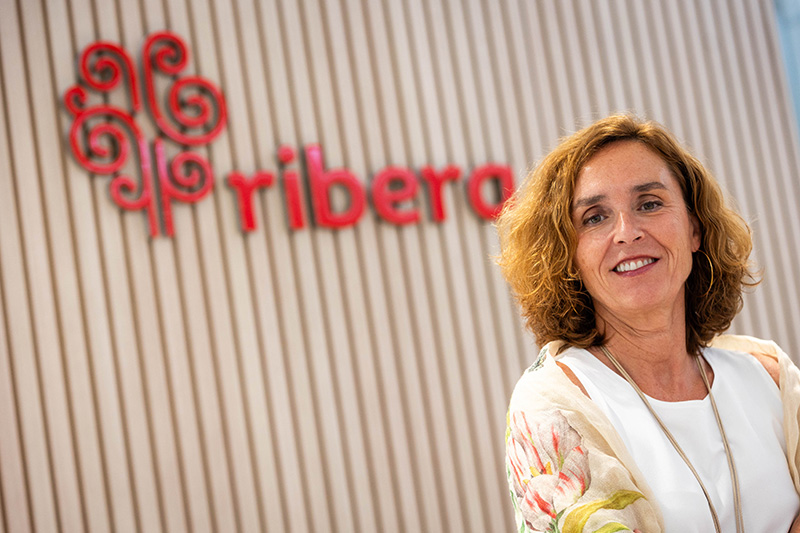
by S0p0rt3 | Oct 19, 2023 | Ribera |
- Both entities will work on the development of research projects and the application of cutting-edge technologies, such as Generative AI or machine learning, in the field of healthcare for the modernisation and transformation of medical records and medical information capture processes, among others.
- The joint developments of Artificial Intelligence solutions will help optimise administrative processes and improve healthcare, supported by Microsoft’s cloud services, which offer maximum guarantees in terms of security, privacy and regulatory compliance.
- The agreement also makes Futurs, Ribera’s technology company, a Microsoft partner. It will also promote interaction with startups and innovative companies to address challenges in the field of healthcare for the benefit of patients and improved care.
Microsoft and the Ribera healthcare group have announced a strategic partnership to advance the use of cutting-edge technologies, such as Artificial Intelligence (AI) and Generative AI, in the field of healthcare. This alliance aims to transform and improve patient care and healthcare management.
A key aspect of this agreement, which was signed today by Elisa Tarazona, CEO of the Ribera Group, and Alberto Granados, President of Microsoft in Spain, is the application of Generative AI to simplify administrative tasks in the healthcare sector. For example, these innovative solutions have the potential to reduce administrative fatigue by freeing up valuable time for healthcare staff, allowing them to focus and devote more time to patient care.
Ribera has a modular medical records platform, Cynara, deployed on Microsoft Azure cloud services, to provide a global response to clinical and administrative activity. The collaboration aims to take the modernisation of healthcare information systems a step further, evolving from a classic vision to a patient-centred one. To this end, Ribera and Microsoft will work on the transformation of information capture processes, throughout all phases of the care processes, by means of non-invasive collection systems. This initiative aims to make medical data management more efficient, humane and accurate than ever before.
In the words of Elisa Tarazona, CEO of the Ribera Group, “We are committed to offering the best possible medical care to our patients, and we are committed to digitalisation, hand in hand with a leader like Microsoft, which will help us take an important step forward by taking advantage of the latest technologies. Microsoft has always been a close ally and, with the application of AI, we can make a disruptive leap in our processes, free up administrative time for our healthcare professionals and focus on what is most important: caring for people’s health”.
At Microsoft, we are committed to driving the digital transformation of organisations across all industries,” said Alberto Granados, president of Microsoft Spain. AI has the potential to improve healthcare and medical care and accelerate scientific research. It is a tool that will be a revolutionary step forward in both diagnosis and treatment, and we are excited to reach agreements with organisations in this sector, such as the Ribera Group, that are committed to innovation to improve the quality of care.
Ribera is part of the global Microsoft 365 Copilot Early Access Program, which places the organisation in a pioneering position in the use of Generative AI. Copilot integrates into the Microsoft productivity environment applications that professionals use on a daily basis, helping them in their workflow and freeing them from repetitive tasks so they can focus more on their ultimate goal. Ribera and Microsoft are defining functional and process groups where Copilot could help optimise their way of working, assessing its impact, both at the level of administrative processes and potential tasks of clinical work groups or specialties.
The economic boost from the cloud
The cloud and the innovative services it supports, such as Generative Artificial Intelligence, have become one of the main priorities for companies, as it is key to accelerating the digitalisation of organisations and a fundamental pillar for generating revenue and reducing costs.
A recent study by IDC analyses the economic and social impact of the Microsoft cloud in Spain, its long-term implications and the growth opportunities it represents for companies. In the healthcare sector, the cumulative economic growth in the period 2022-2025 is estimated at 540 million dollars. Collaborations such as the one initiated with the Ribera Group translate into significant progress in internal activity, impacting on the organisation’s productivity and economic results.
Collaboration with startups and innovative companies
The agreement signed between Microsoft and Ribera also involves collaboration with Futurs, the group’s technology company, which thus becomes a Microsoft partner. Futurs’ objective is to provide an optimal and comprehensive response to the needs of the population, transforming healthcare through innovation and technology. Futurs develops both proprietary solutions and co-innovation projects, and offers strategic consulting, development and IT operations services for healthcare institutions, both in Spain and abroad.
The collaboration between Ribera and Microsoft also includes a commitment to the development of digital health projects on several fronts, using Microsoft technologies to improve the quality and efficiency of medical services. This includes the implementation of video consultation through solutions such as Microsoft Teams, as well as the modernisation of Ribera’s administrative, logistical and internal staff management platforms and processes.
In addition, Microsoft and the Ribera Group are looking to the future, with plans to interact with the ecosystem of partners and startups in the healthcare sector. To this end, workshops will be held to evaluate solutions provided by startups in response to the needs identified, and advice and guidance will be provided within the programmes offered by Microsoft for startups and scaleups working in the field of healthcare.
For more information, please visit the Microsoft UK News Centre.
About Ribera Group
Ribera is a business group founded in 1997, specialising in the management of innovative healthcare projects. With more than 9,200 professionals, its vocation is to transform the way we work and innovate in healthcare management, to improve the health and wellbeing of the population.
About Microsoft
Microsoft (Nasdaq “MSFT” @microsoft) is driving digital transformation for the era of the intelligent cloud and the Intelligent Edge. Its mission is to help every person and every organisation on the planet do more in their everyday lives.

by S0p0rt3 | Oct 3, 2023 | Ribera |
- Around 1,000 samples are analysed daily between Primary Care and the hospital itself, where the number of professionals has been increased and automation has been expanded, as in the group’s central laboratory.
- There are now five Ribera Group hospitals integrated in Ribera Lab: Ribera Polusa, Ribera Juan Cardona, Ribera Hospital de Molina and the Vinalopó and Torrejón university hospitals, in addition to their health areas.
Ribera Lab, the laboratory division of the Ribera healthcare group, has taken on the integral biological diagnosis of all patients at the University Hospital of Torrejón and its health area, i.e. the analysis of all samples taken from patients at the hospital and the area’s primary care centres. The analysis and management of all blood, urine and biological fluid analyses in Torrejón has meant a reinforcement of professionals in the health centre itself and in the central laboratory of Ribera, as well as in the automation processes.
The Torrejón Hospital laboratory alone analyses around 1,000 samples a day, from its own patients and primary care centres. For its part, Ribera Lab’s central laboratory has technology that allows it to carry out more than 3,000 determinations a day, with technology capable of analysing 800 tubes an hour, with the capacity to increase it as required.
Ribera Lab has more than 120 professionals and is already integrated in five of the health group’s hospitals: Ribera Polusa, Ribera Juan Cardona, Ribera Hospital de Molina and the university hospitals of Vinalopó and Torrejón, in addition to their health areas. It has a constitutional, prenatal and oncohematological cytogenetics laboratory, a molecular biopathology laboratory for hereditary diseases, infections and oncohematological diseases, in addition to the central clinical laboratory. In addition, the group’s laboratory division covers other clinics and hospitals within the group as well as external healthcare centres. “Responding efficiently and swiftly to patients’ needs is always our priority,” says Ribera Lab management director Mayte Alarcón.

by S0p0rt3 | Sep 29, 2023 | Ribera |
- It is ranked 67th in the analysis carried out every year by Actualidad Económica, which measures the actions of companies to attract talent, promote a good environment, CSR actions and training.
- Ribera is the first hospital group on the list, which highlights its significant commitment to internal promotion and career development for its employees.
The Ribera healthcare group is one of the 100 best companies in Spain to work for, according to the ranking prepared each year by Actualidad Económica, which analyses and scores the actions of hundreds of companies to attract talent, foster a good atmosphere and teamwork, Corporate Social Responsibility (CSR) actions and training. Ribera is in 67th place this year and is the first hospital group in the ranking, in which its commitment to internal promotion and career development of its employees is especially valued. Specifically, the group offers continuous training and growth opportunities, as well as internal offers for job changes, so that professionals can design and adapt their professional career as they wish.
Ribera, which already has twelve hospitals, 64 Primary Care centres, 38 polyclinics and a University School of Nursing, among other projects, is the highest rated hospital group in this ranking due to its People management policy and a comprehensive vision of the needs of its professionals, which also includes an “emotional salary”, personalised and adapted to the needs of each one, including facilities for flexibility, training and conciliation with the aim of ensuring their physical and emotional well-being.
“Attracting and retaining talent is one of our main objectives as a company and the most important challenge we face every day, given the current shortage of professionals in the healthcare sector; hence our efforts to improve the employee experience, putting ourselves in their shoes and placing them at the heart of the company’s strategies, in order to guarantee their satisfaction and commitment”, Ribera assures.

by S0p0rt3 | Sep 18, 2023 | Ribera |
- The president of the health group stresses the importance of involving all stakeholders in tackling health challenges and the invaluable contribution of the media in this task.
- The awards are created to consolidate the legacy of the renowned health communicator, founder of Salut i Força.
The president of the Ribera Health Group, Alberto de Rosa, has been awarded in the first edition of the Joan Calafat Health Awards with an Honourable Mention for health management. These awards were created to consolidate the legacy of Joan Calafat, a renowned health communicator who passed away in 2022, founder and first director of the television programme Salut i Força, and of the paper publication of the same name, as well as to promote health care and research.
The awards ceremony, organised by the magazine Salut i Força last Friday in Mallorca, was attended by numerous political authorities and personalities from the world of health, professional associations and representatives of private healthcare, as well as academics and researchers, such as the president of the Balearic Government, Margalida Prohens; the president of the Consell de Mallorca, Llorenç Galmés; the councillor for Health, Manuela García; the manager of IBSalut, Javier Ureña, and the director of Salut i Força, Carlos Hernández, among others.
During the presentation of the award, Alberto de Rosa stressed the need for all agents to collaborate in order to face the global health challenges in this post-pandemic stage. “The contribution of the media is invaluable as an agent of influence in society, which can contribute to improving the quality of life of citizens through its informative and informative work”. The president of the Ribera Group also had words of recognition for the founder of the publishing house. “Joan Calafat was a pioneer, a teacher for many communicators and health professionals,” he said.
In addition to the health management award received by Alberto de Rosa, other awards were presented at the same ceremony, such as the prize for the best final degree project (TFG) in Medicine at the UIB, the best TFG in Related Health Sciences, and three honorary prizes awarded respectively to the best nurse of the year, the best doctor of the year and the best pharmacist of the year.

by S0p0rt3 | Aug 3, 2023 | Ribera |
- The healthcare group highlights its humanisation plans for healthcare and its actions in health promotion and prevention, as well as its innovative and flexible People Management policy, in which effort and dedication are rewarded.
- It is also making progress in its environmental policy, with new measures to save energy and water and 84% of renewable energy.
The Ribera Health Group has presented its Sustainability Report 2022, which highlights the creation of the Ribera Salud Foundation, the high levels of job stability and well-being of its professionals, the renewal and approval of new environmental certifications that contribute to the sustainable development of its activity, new measures for saving energy and water and its action plan with the community, in terms of health promotion and prevention.
Sustainability has become a cross-cutting element of the Ribera Group’s strategy. In addition, the new corporate sustainability reports have a forward-looking approach with time scenarios, are being adapted to the new European sustainability standards (ESRS) and always link financial and non-financial information.
Specifically, the Ribera Salud Foundation was registered in the Register of Foundations of the Generalitat Valenciana in March 2022, and aims to “promote innovation and contribute to creating a better future, giving people the necessary tools to improve their quality of life, through health management and education”. It is also committed to cutting-edge research.
With regard to the People Management policy, the Ribera healthcare group considers it one of the main contributions to its management model, being one of the strategic pillars in the success of its healthcare projects. “The key to the group’s success is its professionals”, they state in the Annual Report. For this reason, they state that they are committed to “an innovative and more flexible People Management policy, in which effort and dedication are compensated”, in addition to the generation of stable, quality employment through continuous training and internal promotion “as a way of retaining talent and optimising the working environment”. The Ribera Group also explains in its report that it establishes and develops initiatives “that integrate equal treatment and opportunities”. Not surprisingly, 70% of its professionals are women and nearly 90% of its staff have permanent contracts.
Ribera also assures that continuous training “is the key to success, the main objective of the group being to facilitate the process of updating and developing the knowledge, skills and attitudes necessary for the correct performance of the job, while at the same time it is a tool for improvement in order to achieve corporate objectives”.
Among the environmental values analysed, the Ribera Group highlights the fact that 84% of the energy consumed in its twelve hospitals, 64 primary care centres and 35 polyclinics is of renewable origin. In addition, the healthcare group has numerous environmental certifications and a corporate Environmental Policy that is applied to the activity of all its work centres. The management of energy, waste and development, as well as the constant monitoring of the results of the climate strategy are some of the cornerstones of its environmental policy. Not surprisingly, it allocates almost one million euros to the prevention of environmental risks.
It also highlights in its report the certifications obtained in previous years and which are renewed annually, adding in 2022 the ISO 14001 certification of Environmental Management Systems of the Hospital Universitario del Vinalopó and the Carbon Footprint certification in the hospitals of Denia, Ribera Hospital de Molina (Murcia) and Ribera Juan Cardona (Ferrol). And during 2022, the Ribera Group has developed action plans focused on expanding the number of hospitals with its certified carbon footprint; registering the carbon footprint with the Ministry of Ecological Transition and the Demographic Challenge; continuing to reduce the use of plastic; training professionals in good environmental practices, with special emphasis on the correct segregation of waste; and raising awareness of the sustainable use of resources.
In its 2022 Sustainability Report, the Ribera Group highlights that the Vinalopó Hospital has four Joint Commission International accreditations (Enterprise, Coronary Bypass Surgery Programme, Vinalopó Health Department and Hospital) and that the Ribera Povisa hospital has also been accredited by the Joint Commission International. This is the most prestigious health accreditation that allows these hospitals of the group to be among the best centres in the world. In fact, one of the key aspects to obtain it is to accredit good risk management, specifically the environmental part of management.
The group’s Humanisation programme has also made progress in 2022. Dénia Hospital has launched a Care Plan for patients with severe functional diversity, which is already in operation at Vinalopó Hospital; Ribera Hospital de Molina has implemented a protocol to allow pets to visit patients; and all Ribera hospitals have committed to music therapy with workshops and live performances and the group’s new Spotify channel, with playlists adapted to patients, families and professionals and a health podcast. In addition, corporate volunteering has been strengthened and collaboration has increased with the Discamino Association, which accompanies people with functional diversity on the Camino de Santiago.
The commitment to society in terms of health promotion and prevention has been reflected in 2022 through all the workshops, conferences, exhibitions and activities organised for patients, in the healthcare centres themselves or in schools and associations. In addition, patient councils in all hospitals have once again become face-to-face, and Ribera Juan Cardona (Ferrol) and Denia hospital have launched this advisory body in 2022, made up of the main patient associations, which meets regularly with the management of the respective hospitals. Professionals from the group have taught thousands of children the Ribera song to learn how to perform Cardiopulmonary Resuscitation (CPR), the Torrejón Hospital has recovered the Camino de Cervantes and the group has published the first children’s story to help children control sugar consumption.
Summary of the Ribera Group Sustainability Report






Recent Comments